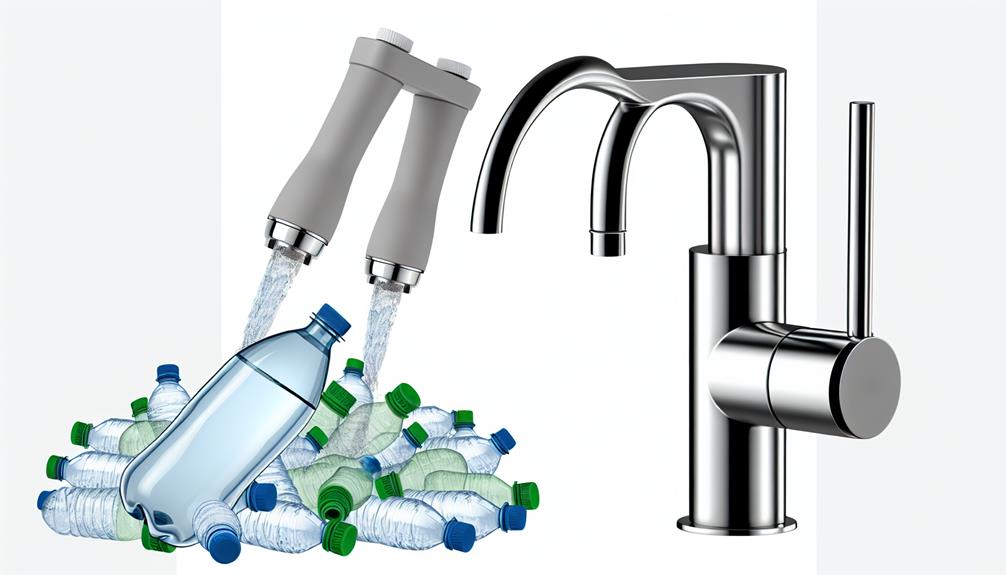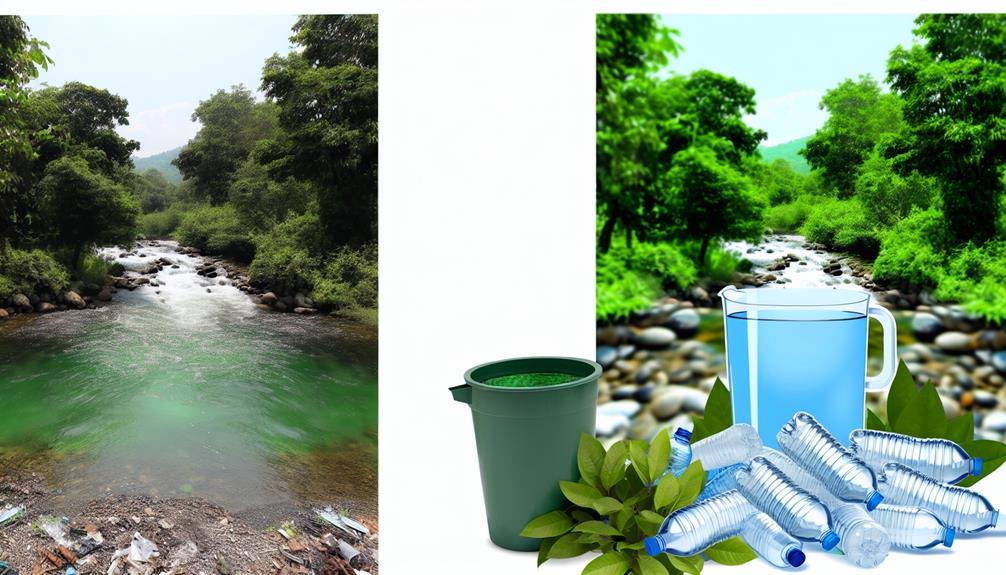As you consider the environmental impact of your daily choices, remember that reducing, reusing, and recycling are as relevant to your water consumption as they are to your solid waste.
You've likely heard the rallying cry against single-use plastics, but what you may not realize is how integral water filters can be in amplifying your conservation efforts. By incorporating a water filter into your routine, you're not only minimizing plastic waste but also enhancing the efficiency of your appliances and lowering overall energy consumption.
These simple devices can promote sustainable practices in more ways than you might expect. So, let's explore how something as unassuming as a water filter can be a powerhouse in your personal environmental campaign and consider the ripple effect your choices have on the global stage.
Minimize Plastic Bottle Use
Embracing water filters is a decisive step you can take to significantly curtail your reliance on environmentally detrimental single-use plastic bottles. By investing in water filtration systems, you're adopting an eco-friendly water filter approach that not only ensures access to clean drinking water but also champions the cause of reducing plastic waste. Using water filters in conjunction with reusable water bottles creates a powerful combination that directly tackles the issue of plastic pollution.
Your move towards water filter systems reflects a conscious effort to avoid the use of plastic and its associated negative impacts. Notably, such a shift can lead to a substantive reduction in microplastic pollution, which plagues both water sources and food chains. Remember, each filtered refill in a reusable bottle translates to one less plastic bottle potentially reaching landfills or oceans.
Furthermore, by reducing the demand for single-use plastic bottles, you're indirectly contributing to a decrease in fossil fuel consumption used in plastic production. The ripple effect of your choice extends beyond immediate environmental benefits—it's a vote for a sustainable future. Thus, using water filters isn't merely a personal health choice; it's an active stand against the global plastic waste crisis.
Enhance Appliance Efficiency
Water filters not only provide you with cleaner drinking water, but they also play a crucial role in enhancing the efficiency and longevity of your household appliances. By using a water filter, you're actively investing in the health of your home water systems and appliances.
Here's how water filters contribute to energy efficiency and appliance performance:
- Sediment Removal: Filters remove small particles and sediment that could otherwise accumulate in your appliances, causing wear and tear. This sediment can affect moving parts and clog systems, leading to reduced efficiency and potential breakdowns.
- Energy Consumption: Appliances that utilize hot water, like dishwashers and washing machines, work more efficiently with filtered water. Unfiltered water can contain minerals that build up and make it harder for these appliances to heat water, increasing the amount of energy needed.
- Longevity of Appliances: Filters protect your appliances from the damage caused by hard water. By preventing scale and buildup, your appliances can last longer, reducing the need for costly repairs or replacements.
- Environmentally Friendly: Countertop water filters and under-sink filters not only ensure cleaner water but also help in conserving the environment by reducing the need to discard damaged appliances, thus saving on both plastic and metal waste.
Lower Energy Consumption
Beyond enhancing appliance efficiency, installing water filters in your home also leads to lower energy consumption, as these systems facilitate significant reductions in the energy required to process and heat your water. By using energy-efficient water filtration systems, you're not just improving the overall quality of your water; you're also engaging in eco-friendly practices that contribute to a more sustainable lifestyle.
Water filters reduce fossil fuel dependence by minimizing the energy used in manufacturing, transporting, and recycling single-use plastic bottles. This reduction in energy correlates directly with decreased greenhouse gas emissions, helping to reduce your carbon footprint. Moreover, filters reduce fossil fuel consumption further by eliminating the need to buy bottled water, thus reducing bottles use and the related environmental impact.
With every refill of a reusable bottle from your water filtration system, you're contributing to a cycle of conservation that benefits the planet. You're also reducing microplastic pollution, which has become a growing concern in both water sources and food chains.
Promote Sustainable Practices
By integrating various types of water filters into your home, you're not only ensuring cleaner water but also fostering eco-friendly habits that contribute to larger conservation efforts. Investing in a water filtration system can help you adopt sustainable practices that help the environment by reducing your reliance on single-use plastic bottles.
Here's how:
- Reduce Plastic Waste: Using a water filtration system at home means you'll need less plastic bottles, which directly decreases plastic pollution and the energy used in plastic production.
- Enhance Appliance Efficiency: Water filters protect your appliances from sediment buildup, which can lead to reduced energy consumption and longer lifespan for those appliances, saving you money and reducing your carbon footprint.
- Support Wildlife Conservation: Less plastic waste from bottles means fewer pollutants in our oceans and rivers, thus protecting aquatic life and contributing to overall wildlife conservation.
- Promote Eco-Friendly Products: By choosing water filters, you're supporting the market for eco-friendly products, which encourages companies to innovate and produce more sustainable goods.
Embracing the use of water filters is a significant step towards living more sustainably. You're not just filtering water; you're filtering out harmful environmental practices.

